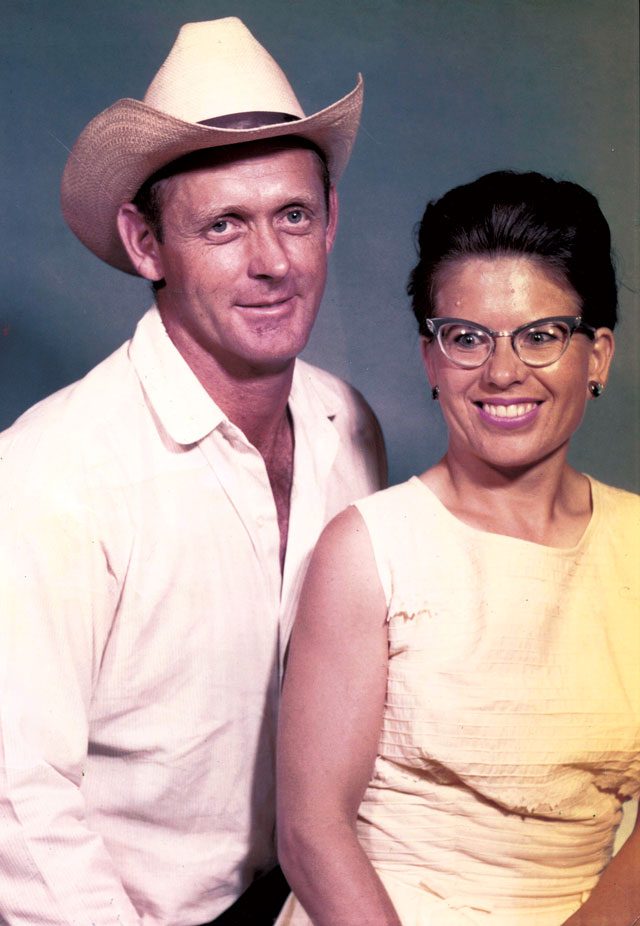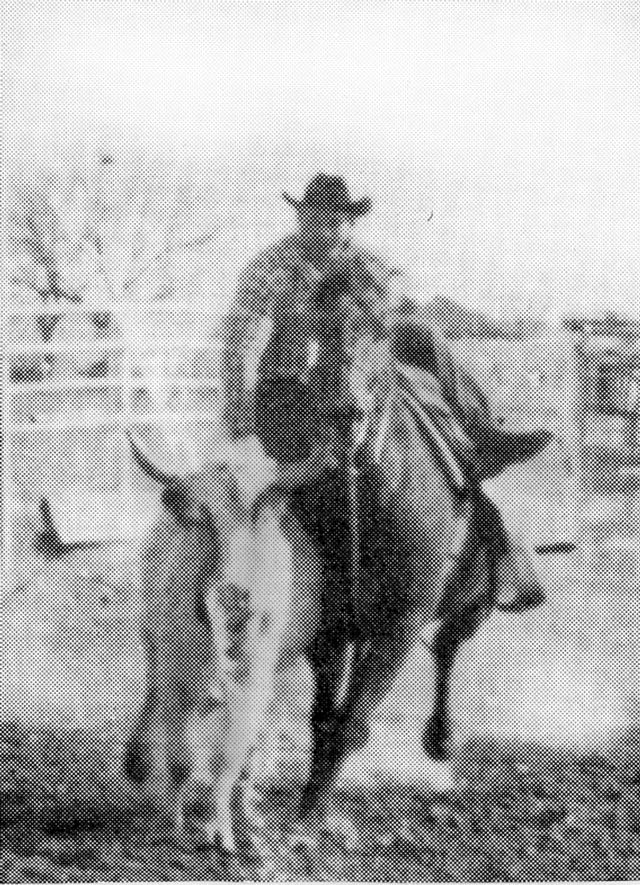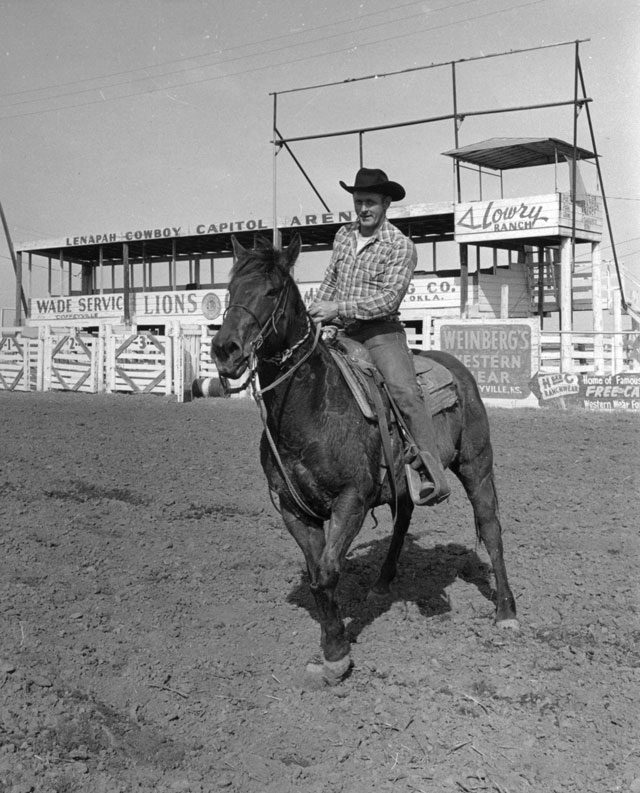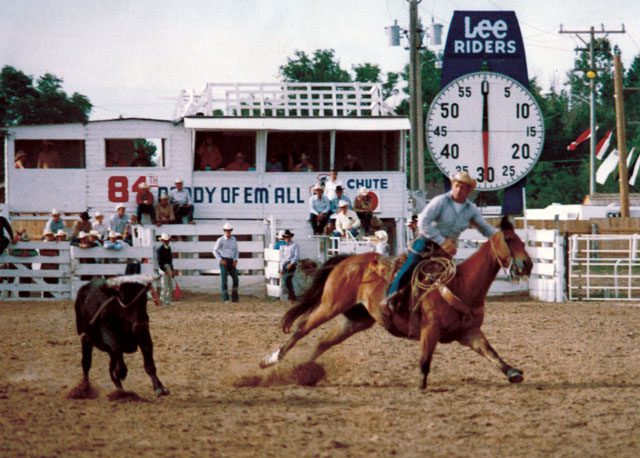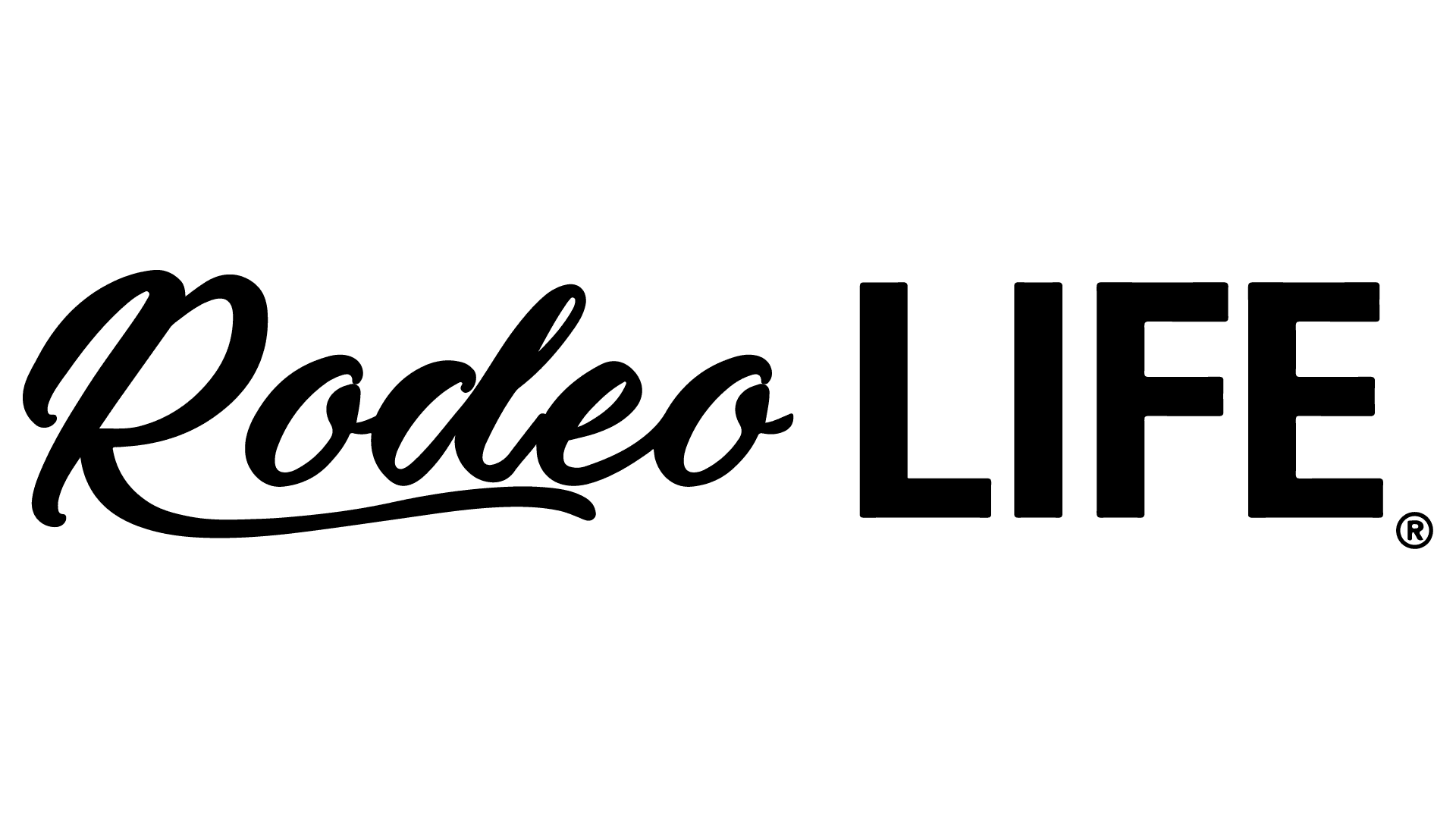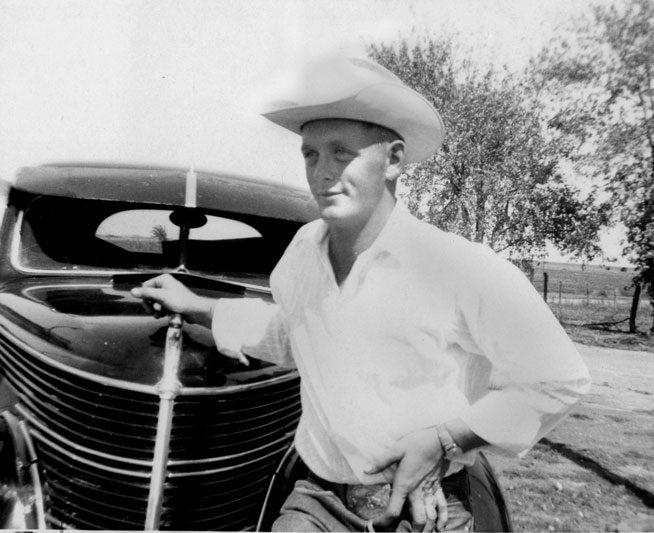Harry Straw married well.
When he married Betty Jane Webster, the sister of world champion steer roper Shoat Webster, he got an incredible horsewoman for a wife, the use of her horses, and the advice of her brother, Shoat.
He was born and raised in Nowata, Okla., the son of Homer and Lillie Straw, with a daddy who roped, and Harry would tag along to rodeos with his father. His dad made a living driving truck, hauling hay to western Oklahoma and grain on the return trip. The family lived on 125 acres of corn, oats and wheat, and Harry and his mother milked ten cows by hand, separated the cream, and sold it to Gus Andrews in Nowata for grocery money. Harry hunted possums at night with his possum dog, making thirty five cents a hide. “It was kinda tough,” he said. “That’s how I was raised.”
He learned to rope at Deacon May’s place. Deacon had a roping pen, and when Homer came over to rope, Deacon’s son and Harry would run calves in.
During his high school days, he worked for his uncle, who owned a Phillips gas station in Nowata, pumping gas for fifty cents a day.
After high school graduation in 1955, he went to work for Phillips Petroleum in Bartlesville, working in the plastics department.
And in the evenings, he’d rope.
Harry would come home after work, and Betty Jane would have the horses ready. “I’d get home by five, she’d have horses loaded, saddles in the pickup, and away we’d go,” he said, to a rodeo where he’d rope calves, steer wrestle or steer rope.
His wife was better with horses than he was, he readily admitted. “She could do more with a horse than I could,” he said. “Shoat had her pretty well tutored before I got her.” She also trained horses, and “she could rope better than I could,” he said. But Betty Jane only roped at home, never at a contest.
Harry roped evenings and weekends, never going too far out of Oklahoma, and concentrating mostly on steer roping. Steer roping was his strength, and his daughter Jeannie McKee remembers camping out at Cheyenne Frontier Days with her family while her daddy roped. He competed at amateur rodeos and in the Rodeo Cowboys Association as well.
He worked for Phillips Petroleum for 33 years and was part of the research team who developed plastic pipe. Phillips built four plastic pipe plants across the country: in California, Texas, Pennsylvania, and Pryor, Okla., and Harry was sent to train employees and work with the machinery. “They’d send me to get them out of trouble when the machines acted up. I’d go there, and train them.”
Harry often practiced with Shoat, his brother-in-law, a four-time world champion steer roper (1949-50, 1954-55) and twice runner-up. Shoat made his own horses, and Harry usually rode one of his. One of his favorites of Shoat’s was Deck, a calf horse and son of Leo. “Shoat made him, and boy he made a good one,” Harry said.
Another horse he liked to ride belonged to Willard Combs. The famous steer wrestling horse Baby Doll “was a dream to bulldog off of,” he said. “She was all right. She done the same thing every time, she’d run right up (to the steer), and let you down, not try to cripple you or cut in front of the steer. She done everything just right.” Harry rode the little blaze-faced dark bay anytime Willard or his brother Benny offered.
But, in his estimation, the best horse he ever got on was one owned by his wife. Betty Jane’s aunt Kate (Choteau) Lowry, the wife of Fred Lowry, took her into one of Fred’s pastures one day. “We was out in the big pastures on the Lowry ranch,” Harry remembered, with 35 mares and weanling colts, “and Kate told Betty Jane to pick a colt. That colt made the best steer horse I ever had.” The horse, named Chico, belonged to Betty Jane, not Harry, and “she never did let me forget that,” he chuckled.
Betty Jane broke and trained the gelding, who was a Hancock horse. The horse liked to buck. “He didn’t buck hard, but he had to crow hop out there every night, till he was eight years old.” One time, at Cheyenne Frontier Days, someone offered Harry $5,000 for Chico. “I just laughed at him,” he said. “There was no way I was ever going to sell him, or do anything with him but rope on him.” And Chico wasn’t Harry’s to sell anyway. “He didn’t belong to me, he belonged to my wife.”
Aunt Kate Lowry had a big heart and was willing to help anyone, including her niece and nephew. She didn’t ride much, Harry said, but she helped pay his entry fees. “When I first started roping, she’d stop by the house to see my wife and me, and she’d always ask, did I need a little entry fee money. Aunt Kate would help anybody.” Harry was reluctant to take her money, but in the early days, he did. “She’ll always have a soft spot in my heart.”
Harry rodeoed with the likes of Harry Swalley, Don McLaughlin, Sonny Davis, Troy Fort, and Sonny Worrell. He remembers their friendships and the characteristics each one had. Swalley was like Harry, a cowboy with a fulltime job, who “was the only guy who could work hard enough to keep up with Shoat,” he said. And Don McLaughlin, for his ability to remember cattle. “Don could be at a roping where they had 100 steers, and three years later, he could tell you what everybody (drew) and what they did on them.”
Harry spent a lot of time with Shoat in the practice pen. Shoat was “an extremely, extremely hard man on his horses, his dogs, anybody who worked for him or practiced with him,” a family member said. “He was rough and tough and hard to please.” But Shoat was never hard on Harry, and he attributes that to his wife. “I don’t know what Betty told him, but the only thing I knew was Shoat was scared of his little sister, and she didn’t weigh 95 lbs. Still to this day, I don’t know what she told Shoat, but he never treated me like anybody else.”
Harry and Betty Jane had two children: a son, Lee, who married Christie and has two children, Tori, and R.J., and daughter Jeannie, who married rodeo announcer Justin McKee and their daughter, Kassidy. Justin says people love Harry. “My father-in-law is the most well-liked human being who ever lived. He’s everybody’s favorite guy, non-judgmental, the most genuine, likeable, nice guy there ever was. Anybody who knows him, would agree one hundred percent.”
“I had an awful good life,” Harry said. “I’ve been the luckiest man alive. I had the only woman who would ever live with me, and I’ve had some awful good horses to rope on, and Shoat to rope with and help me. I’ve had a pretty good life.”
In 1955, he and Betty Jane moved to Lenapah, where they lived until Betty Jane’s passing two years ago. Harry just recently moved to a nursing home, and spends many days at the McKee household, surrounded by the love of his daughter, son-in-law, and granddaughter.
Harry served in the Army and was stationed in Washington State from about 1948 to 1951.
